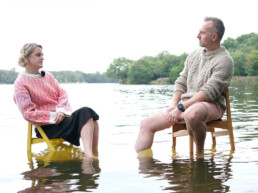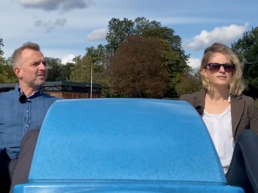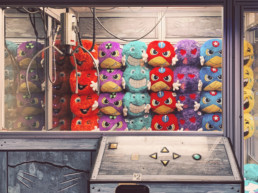Salt // six
It’s felt like a bit of pivotal year this year. Last year, turning 5 felt like a big milestone, but maybe it’s this year that’s really sunk in. It’s been a year of discovery, evolution and excitement, and we’re very much ready for year 7!
The speed of progress
I’ve reached the age where I am having to push myself to keep up with new technology and not resist it. Don’t get me wrong, I love technology and how it can improve the way things are done and make people’s lives better. I mean can anyone remember what they did before mobile phones and the internet?
My challenge is that for some technology ‘making people’s lives better’ isn’t always the purpose, and I question whether we as a society are really thinking about some of their implications and long term effects.
Is it healthy for my fridge to know whether I’ve run out of milk? Or my watch to tell me how badly I’ve slept? I suppose what I’m questioning is that some uses of technology are at odds with improving life and many have more complex implications on our daily lives. For example, is using SatNav in the car all the time making us switch off more when we drive and not pay attention to where we are headed? Meaning we don’t ever get a better feel for directions or relationships of places. Or is it helping us concentrate more on driving, and reducing arguments? Or increasing traffic on smaller roads sending vehicles down side streets that weren’t meant to take lots of traffic? All because we’ve chosen ‘shortest route possible’. What about self-service checkouts? Fine, it can be argued that it makes the shopping experience quicker, and certainly more cost effective for the shop given they are making you do the job and saving on staff. But what if chatting to the checkout person is one of the only times you get to speak to someone every week because you live on your own? What’s the impact of that? Their mental health? Their loved ones? Support networks? the NHS? There are hundreds of similar dichotomies in small and large technological advancements.
What I’m suggesting is that with technological advancement comes a sense of responsibility. We should think carefully about whether the next new fangled thing is really right for a particular task. Technology is agnostic, it doesn’t care what you use it for. It’s up to humans to choose how it’s used. It should be used in a positive way that makes things better or simpler. It needs to make a positive difference to the end user otherwise it’s not adding any value. What do they need? How will they feel? Rather than how much money can I make from this.
What if we apply this train of thought to the most current advancement, AI? It is starting to take off and has incredible opportunities and applications, especially in health. From diagnosing diseases to precision medicine, reducing healthcare costs, reducing adverse drug responses and enhancing efficacy. For example, as humans get tired looking at the 20th mammogram of the day, AI learns from repetition and becomes more accurate.
But can we guarantee that AI will be used for good? How do we stop it being used in weapons and to flood the internet with fake videos, images and news so people won’t know what is true anymore? And as fatalistic as this sounds, be a risk to humanity, upending the job market and taking over? How do we ensure something so vastly superior to us does what we say? As Geoffrey Hinton (the godfather of AI, formally at Google) put it, ‘You need to imagine something more intelligent than us, by the same difference that we are more intelligent than a frog’. And Stephen Hawking’s warning, ‘We only have to look at ourselves to see how intelligent life might develop into something we wouldn’t want to meet’.
Much like the impact of the industrial revolution in the 18th Century, we now find ourselves in the fourth industrial revolution, with technology progressing at a crazy pace, faster than ever. Awesome on one hand but do we know what we are unleashing on the world and are we able to control the impact before it’s too late? Just because the tech exists, it doesn’t mean it should be used for everything, crowbarred in just because it can be. We should embrace all new technology so that we understand it, but do so with caution so we can ensure we constantly question the ‘why’. And ensure that it doesn’t run away with itself.
Salt // five
It seems like only yesterday that we made the decision to start our own agency, and back then we wouldn’t have believed where Salt is as we turn 5 – transitioning from a start up to an established agency. This year has certainly thrown some curve balls to challenge us, but we have stayed true to what we believe in and have come out of the other side stronger than ever. We couldn’t be prouder of what we have achieved.
The whole world has changed, and with it we need to continue thinking about Salt’s needs and how we operate. Creating balance is key – a place to work (or not if you prefer), a core and expert team, real life client meetings, and some exciting projects and clients to take us into our sixth year. We can’t wait to see what year six has in store for us!
Pause for thought
Since starting Salt with Kath over 3 years ago I continually ask the question ‘are we still striving for and achieving what we set out to do when we started?’ (Go on, ask Kath. she’ll tell you it’s my favourite question). The reason I do this is because we wanted to set up a business with different priorities to ones we’d previously been working within, and wanted to offer companies within health something different. And not just to be different for the sake of being able to say, ‘look at us, we are sooo different, isn’t that great’. But because we want to be able to make decisions based on our beliefs and mindsets, and based on being able to offer our clients something more, something deeper, to challenge them, and to be able to have an impact on both them and their brands.
These foundations are really important to us, and my worry is that it is all too easy to slip back into ‘how things are always done’. By continually asking my question I am sense checking that we are still on a path that we want to be on and if we are starting to veer off in a direction that doesn’t feel right, we can plot a better course, deciding together what that might be and where we want to go. Being in a partnership with someone who shares my outook, and in fact champions our joint aspirations (to greater effect than me) is refreshing and exciting. I like to think that we push each other in that way.
Although I am not currently having one of these freak outs, I find myself in a rare moment of contemplation. Not about whether our offering and set up is beneficial for our employees, our clients and the patients they support, but about our impact on the world. We have woken up in 2021 to a world on it’s knees. The global pandemic is ever present which, beyond the horrific death toll, will undoubtably result in profound long term effects for people both mentally and physically. Family pressures, isolation, job securities, people’s livelihoods, the economy and the future of business in general to name but a few. And that’s not even scratching the surface of the wider impact. What about the all the essential money the governments are injecting into supporting families out of work? What does that mean when they are tightening their belts after this? The continued and increased cuts to public services? Then the knock on effect of that! What about the world we live in, the environment, where do we start!? Well that’s a scary question.
In amongst the negativity and heart ache of the past year there have been some really warming moments. Community spirit, rallying together to support the less able, innovations to reach the more isolated and lonely, companies offering discounts to essential workers, a reduction in air pollution and the renewed understanding of the importance of personal hygiene. What I’ve really liked is how people have adapted and innovated using what they have available to make a difference.
At Salt I’m pleased to say that we had started thinking and doing this already. We make sure that we think carefully about the travel we make and offset our carbon in order to be carbon neutral. We have joined onepercentfortheplanet.org, donating 1% of our gross income to environmental nonprofit organisations. We are actively using our expertise to offer pro bono support to people and charities we are passionate about to enable them to do more. We are also looking at ways we can credibly support people starting out on their career and have interest in the area we work in. But like my continual question I opened this with, I’d like this to be one too that I regularly return to, to ensure we are giving back and investing in our planet and the people who live on it. This is something Kath and I, as well as our whole team, believe in whole heartedly, making sure we are responsible in our actions and continually looking for opportunities to actively make positive influences on our world.
The year that was
Salt // three
Would you Adam and Eve it Salt is three today! Well I think it’s fair to say that year three was certainly not what we expected… well not what anyone expected really. January feels like a lifetime ago, back in the days when you could work together in real life, have meetings, see people, travel. We miss all those things, especially people. Despite the pandemic we have been able to continue working hard and build the agency whilst remaining true to what we set out to do. We have, like everyone, had to pivot our direction, embrace new challenges and find new ways of working. Coupled with lockdown and home schooling it certainly hasn’t always been easy, but we have certainly achieved a great deal that we are proud of.
We are lucky to be able to say that we still love every minute of what we do, are incredibly proud of our team and what we have achieved together, and thankful for the clients who have put their trust in us. Let’s hope year four doesn’t throw quite as much at us as year three, but whatever it has in store, we’re ready for it!
A set up to fail
This blog covers a subject that has vexed me and that I’ve wanted to address for a long time. Certainly people that know me will have been subjected to some of the following in various incarnations over the last 5 years and are probably rolling their eyes right about now.
A companies’ branding needs to be more than just a façade, it needs to be seamlessly stitched into the fabric of every part of the business; how you behave and act as well as look, in order to be believable, build trust, advocacy and happiness in your customers.
For example, in September 2017, SWR, formally South West Trains, unveiled their new branding. As a designer, and a customer, I was pleasantly surprised, ‘Forpeople’ had done a cracking job and the newly refreshed brand looked slick, professional, clean and approachable, with a nod to happier train times in the new name, and hope for a happier future. With that and new ownership, anticipation for a better rail service was high. Unfortunately these two components aren’t enough on their own to change a service. If, as a customer, your experience doesn’t reflect the care and craftsmanship that has gone into the visual communication (and hopefully strategy) then all this hard work is wasted. If you did a survey of SWR customers about their experiences on their trains since the change, I can well imagine that it would be overwhelmingly negative.
Surprisingly some companies not only are all talk, forgetting to walk the walk, but actively set up their customers to fail. A number of mobile phone companies, TV subscription contracts, insurance and other policy renewals to sadly name but a few have been doing this for what seems like years. Instead of rewarding customers for their loyal service they choose to automatically raise the cost for these services once the contract expires, far beyond the going rate, hoping to catch out people with busy lives or those who are vulnerable. Leaving the best deals for new customers only and a bitter taste in existing customers mouths. Others, like SWR, simply hide or make it difficult to claim valid refunds or return faulty goods.
So why do some companies choose to alienate and disappoint, instead of looking to embrace and support? Enticing new people to your brand through exciting offers, product innovation and sparkles is all well and good but if once they are bought into your offering, behind the curtain doesn’t live up to the hype this enthusiasm will quickly wane. a consistent voice, integrity, belief and honesty doesn’t have to cost the earth and can create positive associations and change in both the people who work for them and the customers who want and need what they sell. A virtuous circle that really is win-win.
I recently attended a talk by Huw and Becky, founders of Paynter Jackets, who for me are the epitome of how to get this right. They have thought carefully about their offering and what is important to them and their customers. They have been clever about their business model and have created something different that people want, both in product and experience. They have then executed on these decisions to the letter, giving equal importance to customer relationships, genuinely caring for who and where their jackets go to, as well as to the crafting of the jackets themselves. Ensuring that the Paynter brand experience, as well as the product, is top draw. As a result, retention, advocacy, and brand love is sky high.
I’m not saying that doing all this isn’t incredibly hard work and a labour of love, but that love and hard work is not lost and can be seen in the smallest details; stitches, labels, buttons, emails and instagram posts. In fact on every surface that Huw and Becky touch.
All brand experiences should be like that. Not hoodwinking people into staying ‘loyal’ because it’s too hard not to, but building genuine brand loyalty through knowing and understanding your customer and ensuring the experience they are lucky enough to enjoy is one to be proud of. Not setting people up to fail, but setting people up for the best experience you can give them.
#paynterjacket
Believe
We at Salt have been chatting a lot recently about the fact that we’ve not written a blog since last year. It’s sad how these are the things that are first to go when there is a lot of work on, and given our last post was about the joys of cashflow it was pointed out to us recently (thanks Stuart!) that we may have left the wrong impression. Thank you for the nudge, we are back writing again, talking about what we believe in, ensuring we don’t forget the details or what’s important to us as our business grows.
Something that has been niggling in my mind for some time is around continuity of thought. We are living in exciting times, communication wise that is, before anyone points out the political and humanitarian climate that sometimes quite frankly beggars belief. As an industry, we’re investing more and more time into really understanding business challenges, ensuring we get to the crux of the issue, and our audiences, to find out what makes them tick, what type of behaviour they exhibit and how can we connect emotionally with them in order to ultimately change behaviour. Essentially, how can we make it less ‘us and them’ and more ‘we’.
Coupled with outward exploration we are also spending more time with brands and their teams, to understand them, in better ways than ever before. It’s incredibly powerful to look not only at our customers but also at ourselves, to decide who we are and how we want to be seen. Ensuring the team is aligned on the approach so we are united and empowered to do the best we can, together, and creating positive change as a result.
Unfortunately, these valuable preparations all too often fall at the final hurdle when we look to deliver on them. Without implementing this with the conviction and belief needed, or without using all these learnings along the way, we will end up just talking the talk rather than walking the walk with our heads held high. The people we’re looking to influence aren’t stupid and will be able to see this a mile off, or completely miss the original intention of what we are trying to say. They need to be able to join all the dots and do so very quickly to feel a connection and relate to what we’re communicating.
Now I know we don’t live in a utopian world where everyone runs through fields of corn without a care in the world, but even if we are working with budget restrictions, historic campaign equity, and multiple stakeholder views we still need to ensure we stay on course and true to the core insights uncovered at the beginning of the project.
We need to keep the momentum going. Continue to challenge the status quo, stay true to the decisions made with the same passion we had to begin with, and don’t compromise on the core brand as this is who we are. Invest carefully in execution, the craft and detail all matter, and ensure it is based on all this wonderful and valuable research and nothing else.There are so many points along the journey when you can take the easy path, and it takes a lot more time, effort and commitment to stick with your beliefs when timelines and budgets may tempt you away. But if you do, what you produce and the impact it has will be so much richer and more rewarding in return. So let’s keep doing it.
Salt // one
Last summer, over beer, wine and chips, we discussed our passion and drive for change and to do things differently. A few months later Salt was born, and now we are turning one.
Why did we do it? We wanted to feel free to enjoy what we do, put our experience to good use, make a difference, and to simplify and streamline the way we work so we can offer people more. We had a vision of what we wanted it to be, developed that thinking into our name and brand, and started getting more and more excited about what it could become. Then we took the plunge – with no money, no funding, no loans and no clients. We started with nothing. The last 12 months have certainly been a journey and a half, but an amazing one, and we’ve loved every minute of it.
It was hard to get started – everyone told us it would be, and they weren’t wrong. Days and days of relentless hard work and getting very little back. We had no idea if and when things would take off, but we persevered with complete faith in what we were offering. It’s funny to think back to the first time the phone rang and how excited we were! Of course, it was a recruiter keen to jump on the opportunity of a fresh new client to work with…but our second phone call became our first real-life, fee-paying client. And from then on, we haven’t looked back.
Sure, there have been times when we wanted to tear our hair out, but only a couple and always short lived. Much more significant and memorable are all the amazing times; the fun we have every day, the excitement of a new opportunity, the process of coming up with new ideas, being bold and not afraid of taking a brief to weird and wonderful places, and the difference we can make to the challenge at hand. Over the last 12 months we have been constantly amazed by people’s generosity with their time, expertise and skills, and also with how much it is possible to achieve when you work with constraints, stay true to yourselves and love what you do. We had no idea where it was going to take us, and we still don’t. But if the last 12 months are anything to go by, it’s going to be pretty damn exciting.










This festive season the Salt team assembled a little book of our favourite recipes – we hope you enjoyed it!
We recorded a wonderful 139 downloads, taking our total Food For All UK donation to £1,390.
Thank you for helping us surpass our target donation to this truly worthwhile cause, a charity that supports those struggling to put food on the table in 19 locations around the UK, and 6 sites in Ukraine, Poland and the Czech Republic.